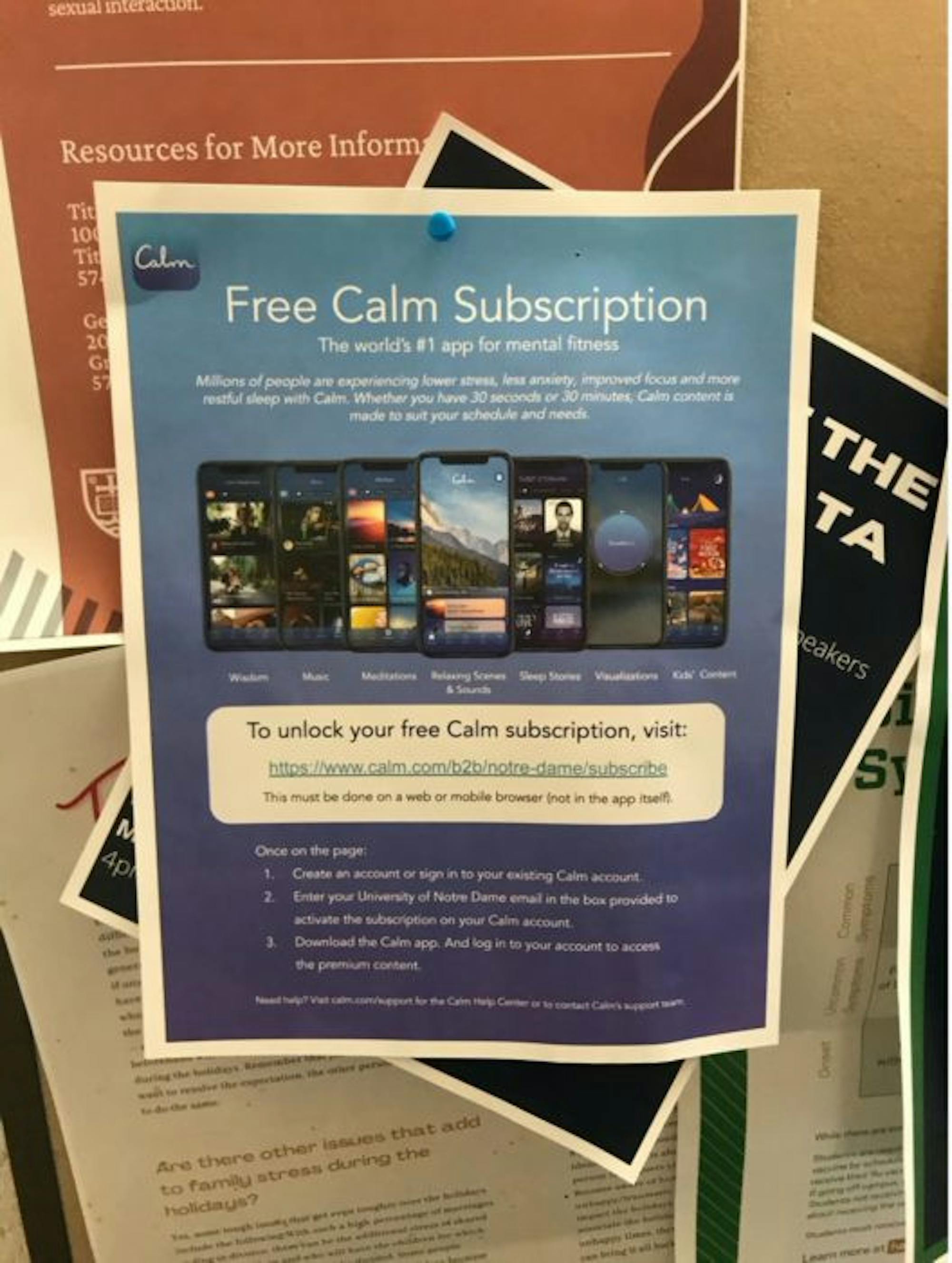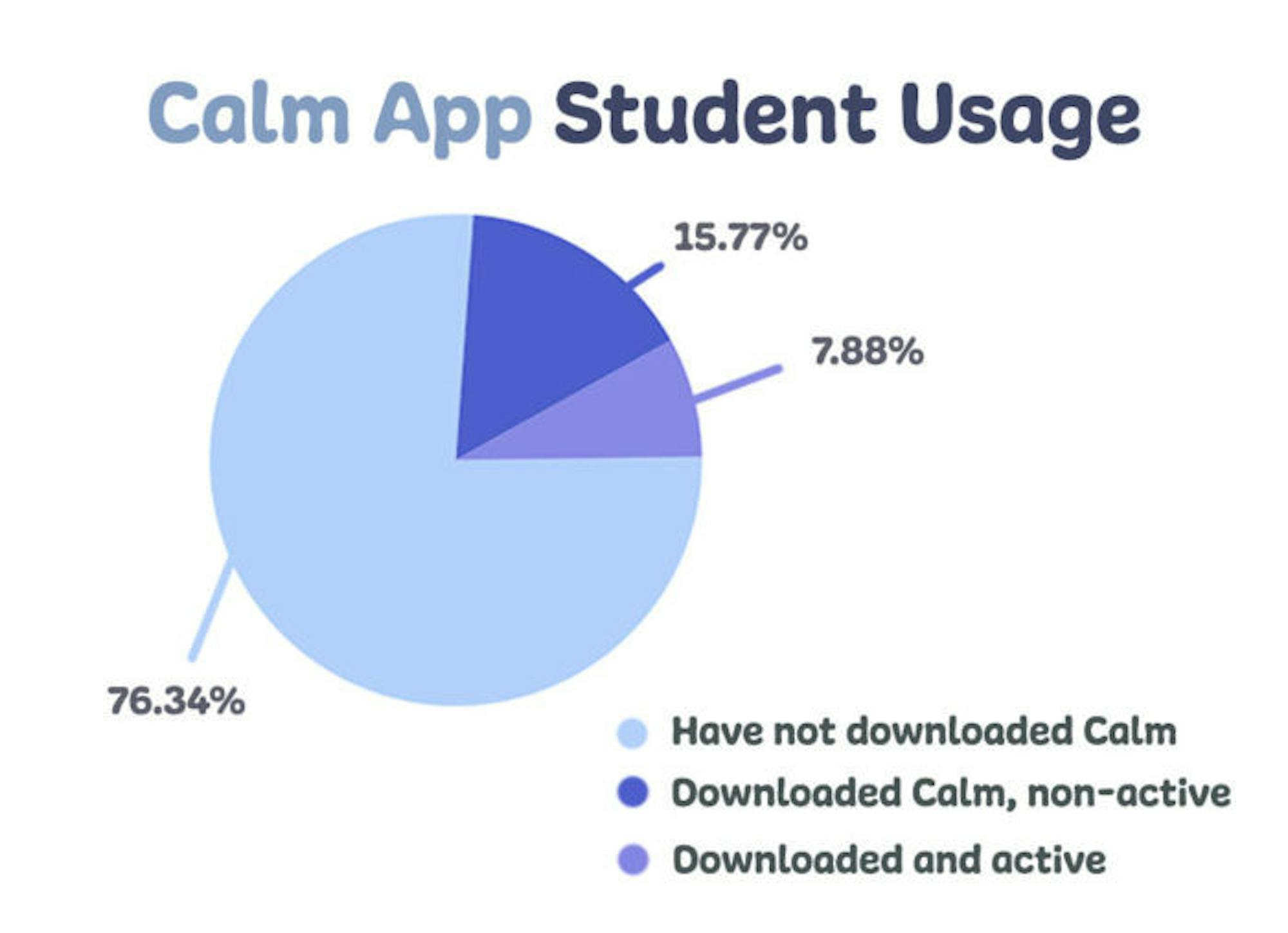After receiving a recommendation for the Calm app in an effort to ease high levels of stress, the Undergraduate Experience Advisory Council and the Graduate Studies and Research Advisory Council funded app subscriptions for both undergraduate and graduate students.
Student responses to the free subscription have been mixed since the semester began.
Some students say the app has not offered strong enough mental health solutions, and the resources used to buy the subscriptions — amounting to $150,000 — could have been better spent elsewhere.
“I don’t actually know a lot of people who are using it and, honestly, I feel like it would’ve been better if we used that money for more counselors,” first-year Darien Vazquez said. “I know a bunch of people who actually really need to see someone and talk about that stuff rather than just have an app.”
Despite student perceptions that few people have downloaded the Calm app, Christine Caron Gebhardt, assistant vice president of student services, said in an email that over 3,000 students have signed up for access, and 2,000 actively engage with the app
Caron Gebhardt also said the idea for the Calm app subscription came from student government and found support in the Emotional Support and Well-being Working Group that includes students, faculty and staff. The group researched various apps, and eventually reached out to the advisory councils to help secure funding.
“Calm was the app students suggested they were interested in,” Caron Gebhardt said in an email. “The purpose is not to use a one-size-fits-all approach, but to help students identify what will help by providing a variety of resources to choose from.”
Caron Gebhardt also said she has only heard positive responses from the campus community and encourages anyone with concerns about the app to reach out and inform her of any issues.
Some student feedback backs up Caron Gebhardt’s claim, including that of junior Julia Monroe and first-year Gabrielle Eslava.
Monroe, who generally uses the app every other day, said she uses the meditation function most often, along with the sleep function and mood tracker.
“When I need to focus on personal growth, work or self-care, I can do that in unique ways through each specialized meditation,” Monroe said. “With the free subscription, there are no barriers or restrictions to taking a mindful moment to rest.”
Eslava said she formerly used Spotify to help manage her anxiety but now opens the Calm app to fall asleep or ease stress during the day.
“As someone with anxiety, if I try to sleep without listening to something, my thoughts will gravitate toward my stressors,” Eslava said. “The nice thing about the Calm app is that it has not only a large selection of sleep-oriented content but also content for calming down during the day.”
Senior Patrick Caslin offered a more middle-of-the-road opinion,
“I can definitely see how it can help people,” Caslin said in regards to the app. “I just haven’t found the need for it personally.”
The subscription is designed to benefit the 32% of undergraduate students and 46% of graduate students reporting stress, anxiety or depression, Mary Hesburgh Flaherty, chair of the Undergraduate Experience Advisory Council, said in an email.
“The University wanted to provide a tangible sign of commitment to students and their well-being,” Flaherty said.
Jim Keenan, chair of the Graduate Studies and Research Advisory Council, said in an email that the council expressed concerns over high levels of stress among graduate students even before this academic year. These concerns have only been exacerbated by the COVID-19 pandemic.
“I know our council was hopeful for broad adoption,” Keenan said. “It seems like we have gone a long way toward meeting a large unmet need.”
Caron Gebhardt said the Calm app stood out from its competitors because it offered a variety of tools and services that would be beneficial for the broader campus community, such as the “Calm Kids” feature, which targets graduate students who might have children.
Although the Calm app has not been adopted and used as widely as possible, council members say they are satisfied with the app’s performance.
When asked about the efficacy and usage of the app so far, Flaherty said she lacks current data but considers the app to be a useful instrument for reducing stress.
“I do not have data on how this is working to date but am sure that this resource will be another tool for students to resume some normalcy in their lives,” she said.
Above all, the council members consider the app an important indicator of care and commitment for the student body.
“Taking the time to be more mindful about our thoughts, feelings and emotions helps us not become overwhelmed by them,” Keenan said. “Offering this service to our students seemed like a wonderful way for our council to make an impact on an issue it cares deeply about.”
University-sponsored Calm app subscriptions met with mixed student responses
The University has been advertising free Calm app subscriptions available to all undergraduate and graduate students.
Elaine Park
Since the University bought subscriptions to the Calm app for all undergraduate and graduate students, approximately 3,000 students have signed up for access and 2,000 have engaged with the app.









